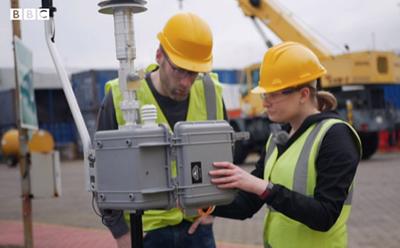BBC report highlights Southampton research into pollution particles

A recent feature on BBC South Today and the Hampshire page of the BBC website highlighted the issue of air pollution in Southampton. Amongst those filmed and interviewed were SMMI colleagues Dr Matt Loxham and PhD researcher Natasha Easton.
Natasha is currently working to identify what the major contributors to our air pollution might be and to quantify how much each source contributes.
“My entire PhD is about characterising air pollution, particularly in Southampton,” said Natasha. “The cruise and cargo ships, if they’re both burning heavy fuel oil then we’ll see this but we can fingerprint whether it has come from a ship, whether it has come from a car, and how much has come from each.
“Different pollution sources emit different chemical tracers which we can then use to fingerprint emissions across the City using multivariate statistics,” Natasha explained. “We are particularly interested in understanding what the contribution from the port is as Southampton is the busiest cruise port in Northern Europe and the second largest container port in the UK, however we don’t yet know how this may affect our air quality.
At this stage I have chemically characterised particulate matter from a number of different locations across the Port of Southampton to identify what the fingerprint of port emissions here is,” Natasha continued. “Currently I am collecting samples for the next stage where we look at the airborne pollution in the City itself, and use these chemical tracers to apportion different source contributions.”
Matt, who is a BBSRC Future Leader Fellow in Respiratory Biology and Air Pollution Toxicology, told the BBC that “very little is known about the very smallest particles – ultra fines – because the hard to collect.
“They’ve been associated with effects on the lungs and the airways and also the hart and the circulatory system which gives cause for some concern about what they might do when people in hale them so this is what we’re trying to work out.”
Visit the BBC report online.
Visit our Research Highlight on ‘Preventing disease in port cities’.